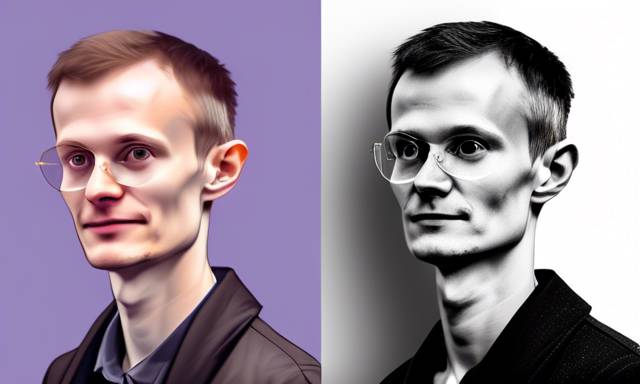Imagine a World Where Big Players Control Your Transactions
Hey there! Picture this: you wake up one morning, flick on your computer, and check your crypto wallet—only to find out that a handful of mega-investors have a monopoly over moving the digital coins you thought were yours. Scary, right? Well, this is the looming reality the crypto market might face if we don’t pay attention to what’s happening with Ethereum, particularly the risks tied to its decentralization. Let’s dive deep into this and figure out what it all means for your investments.
Key Takeaways
- Ethereum’s Centralization Risks: Vitalik Buterin warns that large stakers could dominate Ethereum, raising the odds of attacks and transaction censorship.
- Proposals for Change: Solutions include Proposer-Builder Separation (PBS) and two-tiered staking models to promote decentralization.
- Economic Pressures: Big players can exploit their positions to squeeze out smaller stakeholders.
Let’s break this down because it’s super important if you care about your crypto investments!
The Centralization Dilemma
So, here’s the scoop: Vitalik Buterin, one of Ethereum’s co-founders, highlighted some serious risks in a recent blog post. He talked about how large entities could take over the network due to something known as the proof-of-stake (PoS) consensus mechanism. Put simply, the more Ethereum you hold and stake, the more influence you have. This could create situations where a few big players—think of them as whales—could dominate the entire network.
Imagine this: if one of these whales decides to act maliciously, they could hack the system, censor transactions, or perform a 51% attack. What’s that, you ask? Well, a 51% attack occurs when a group controls more than half of the network’s mining capacity. They could manipulate transactions and effectively control the playground. That’s what Buterin is getting at.
Economic Pressures at Play
Big players have the resources to develop complex algorithms that can optimize their returns on mining and validating transactions. They get a bigger slice of the pie, pushing smaller stakers to either pool their resources (which is a bit risky) or get pushed out entirely. Outrageous, right?
- Maximal Extractable Value (MEV): This term refers to the profit miners can make through transaction ordering. Larger players can implement advanced tactics that smaller stakers just can’t keep up with. This trend isn’t just bad for the little guys; it can lead to an unfair market where only a select few reap the rewards.
Let’s Talk Solutions
But fear not, my friends! Vitalik has some ideas on how to combat this looming centralization. Here’s what he’s suggesting:
-
Proposer-Builder Separation (PBS): This innovative model aims to split the roles involved in block production. Validators (those who check transactions) would no longer construct blocks themselves but would delegate that task to specialized builders. This could help level the playing field.
-
Attester-Proposer Separation (APS): Similar to PBS, this approach would separate the roles even further, making it harder for large entities to monopolize the block-building process. It minimizes those pesky economies of scale we keep hearing about as a disadvantage for smaller players.
-
Two-Tier Staking Models: Introducing tiers of risk could encourage more participants while also providing safety nets for the less experienced investors. The risk-bearing tier allows stakers to earn higher rewards but with penalties for bad behavior, while the risk-free tier shields stakers from slashing but offers lower rewards.
- Transparent MEV Revenue: By capturing and displaying MEV revenue at the protocol level, it could reduce the appeal of centralized MEV extraction—and possibly help with fairer distribution.
The Road Ahead for Ethereum
Buterin’s recent proposals are all about maintaining Ethereum’s decentralization while also improving its scalability. For those wondering, "What does scalability even mean?" It’s basically how well Ethereum can handle an increasing number of transactions. The goal is to achieve over 100,000 transactions per second while keeping the network secure.
Practical Tips for Investors
So, what does all this mean for you, the potential investor? Here are some handy tips:
- Stay Informed: Knowledge is power. Keep up with the developments in Ethereum and other cryptocurrencies. Knowing what’s happening could save your investments from unexpected pitfalls.
- Diversify: Don’t put all your digital eggs in one basket. Invest in various projects and sectors—it cushions you against downturns in one area.
- Consider Risks Carefully: If you’re staking Ethereum or any other coin, know the implications. Understand your stake and how the dynamics could affect your returns.
Personal Insights and Wrap-Up
Honestly, these insights from Vitalik really shed light on the critical state of Ethereum and the broader crypto ecosystem. Just like any market, we gotta keep an eye out for those creeping centralization trends because they can have huge ramifications for how equitable and decentralized we want crypto to be.
So, let’s throw it back to you: How much do you trust the mechanisms behind the crypto you invest in? Will you feel comfortable staking your coins if big players hold the deck? It’s definitely something to thoughtfully ponder as we navigate this digital frontier together. Remember, the future of finance might just depend on how we tackle these challenges today!





 By
By

 By
By
 By
By
 By
By
 By
By